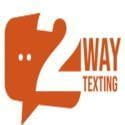Two-Way Texting (2wT) has emerged as a transformative tool in enhancing post-operative care, particularly in Sub-Saharan Africa. The initiative initially took root in Zimbabwe, where it aimed to address the challenges associated with post-surgical follow-up care for patients opting for voluntary medical male circumcision (VMMC). The impact of 2wT on post-operative care lies in its ability to facilitate seamless communication between healthcare providers and patients recovering from surgeries such as VMMC, appendectomies, orthopedic procedures, or cesarean sections.
In regions with limited access to healthcare facilities, 2wT enables medical professionals to remotely monitor patients, inquire about their recovery progress, and provide timely guidance. For instance, after orthopedic surgeries, patients can use two-way texting to report any unusual pain, swelling, or discomfort, allowing healthcare providers to offer immediate advice or adjustments to their recovery plans. In the case of cesarean sections, new mothers can use 2wT to communicate with healthcare providers about postpartum concerns, ensuring a smoother transition into motherhood.
Furthermore, 2wT proves invaluable in addressing the challenges of follow-up care in diverse geographical locations. For instance, in remote rural areas where access to medical facilities is limited, patients recovering from surgeries can send updates on their recovery status through text messages. This enables healthcare providers to remotely assess the patients’ conditions, offer guidance on medication adherence, and identify any potential complications, thereby reducing the need for frequent and often challenging travel to healthcare centers.
Additionally, 2wT can play a crucial role in improving adherence to post-operative care instructions. Patients can receive automated reminders for things such as proper wound care, medication schedules, follow-up appointments, and rehabilitation exercises, fostering a sense of accountability and ensuring that they remain engaged in their recovery process. This approach is particularly beneficial for individuals who may have limited access to transportation or face socioeconomic challenges that hinder regular clinic visits.
In essence, the adaptability of Two-Way Texting extends its benefits beyond specific surgical procedures and diverse geographical locations, making it a powerful tool for revolutionizing post-operative care in Sub-Saharan Africa and potentially beyond. Through enhanced communication and monitoring, 2wT contributes significantly to improving patient outcomes and the overall quality of healthcare delivery in resource-constrained settings.
